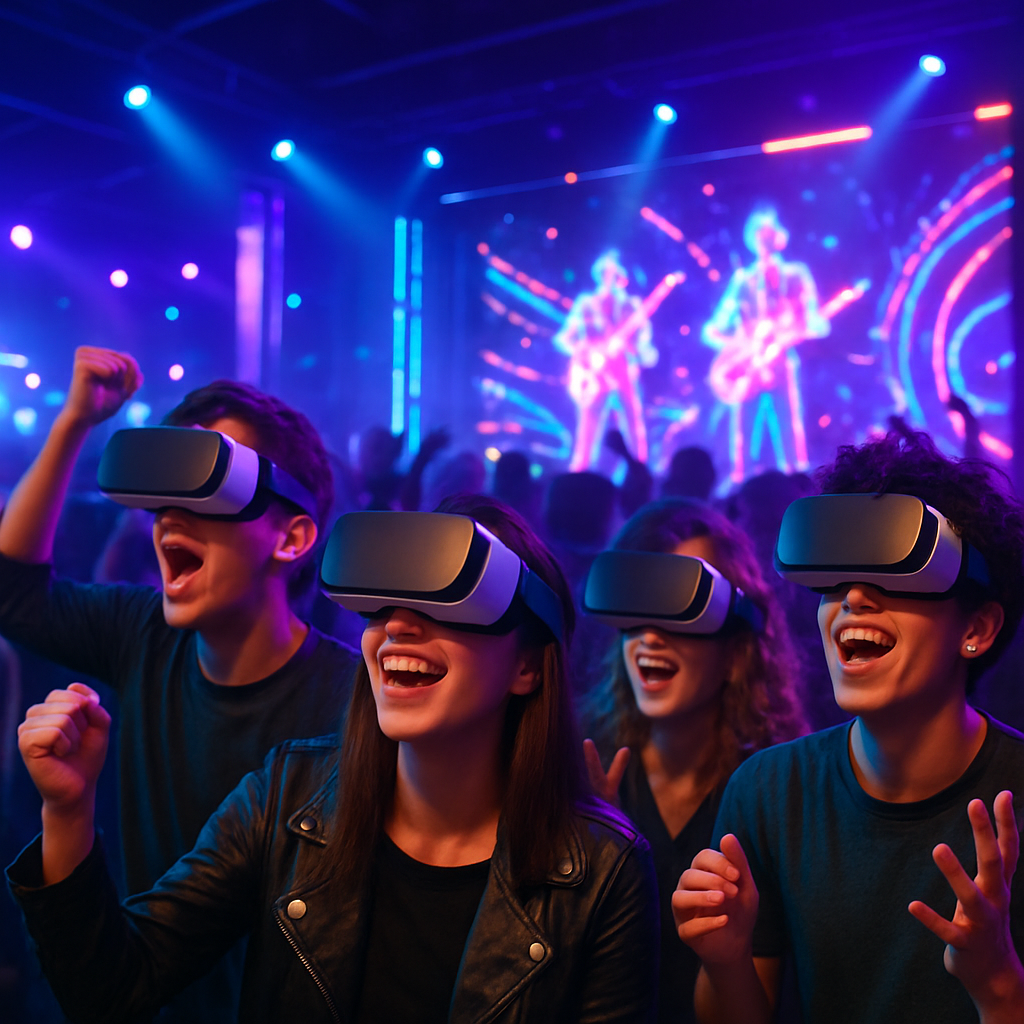The Rise of Virtual Reality Concerts in the Music Industry

Virtual reality concerts are shaking things up in the music industry like a little earthquake on a sunny afternoon. Imagine, if you will, attending a concert from the comfort of your couch, while still feeling like you’re part of the crowd. It’s a bit like being in two places at once, or like when you’re watching a Shakespeare play and suddenly you’re transported to a different era. This futuristic twist on live music is blending technology with the traditional concert experience, creating something new and exciting.
Virtual reality (VR) is no longer just the stuff of sci-fi movies. It’s a real, tangible technology that’s changing the way we engage with music. You see, these VR concerts are like a modern-day musical theatre performance, bringing together the dramatic spectacle of a live show with the accessibility of streaming music online. So, let’s dig into this fascinating shift and see what’s really going on here.
The Allure of Virtual Reality Concerts
The magic of VR concerts lies in their ability to transport us to a concert venue without us having to leave the house. It’s like the way Shakespeare could make you feel like you’re standing in the middle of a storm just with his words. With VR, you just pop on your headset, and voila! You’re in a virtual arena, surrounded by virtual fans, with the band playing just for you.
This experience can be particularly appealing to those who find the hustle and bustle of getting to a concert a bit overwhelming. There’s no need to worry about parking or crowds just pure, unadulterated music. Who wouldn’t want that? Well, maybe it’s just me, but the idea of skipping the long lines at the bar to get a drink or not having to push past a sea of people to find a spot seems like a dream.
Technology is at the heart of this transformation. Companies like Oculus and HTC are leading the charge with headsets that make this all possible. And let’s not forget the platforms like MelodyVR and NextVR, which are making a name for themselves by hosting these virtual events. It’s as if the music industry has taken a page out of a Broadway playbook and thrown in some high-tech special effects for good measure.
A New Kind of Concert Experience
The thing about VR concerts is that they don’t just replicate the real deal they add new dimensions. Imagine choosing your seat anywhere in the venue or even on stage with the band! It’s like having VIP access without the hefty price tag. This element of interactivity changes the game, giving fans more control over their experience. It’s like you’re the director of your own concert film, deciding where the camera goes and what you want to see.
I remember reading about a study by the University of Southern California, which found that virtual environments can evoke real emotional responses. This suggests that VR concerts can be just as moving as the live ones, albeit in a different way. It’s a little like reading a play and then seeing it performed live it’s the same story but told in a way that hits different emotional notes.
Of course, there are some who argue that the energy of a live show just can’t be captured digitally. There’s something about the collective excitement of a crowd that’s hard to replicate. But then again, maybe it’s not fair to compare them directly. Perhaps VR concerts are their own unique art form, like a new genre that defies traditional classification.
Challenges and Controversies
Like any new technology, VR concerts have their critics and challenges. Some people point out the potential for technical glitches, which could disrupt the experience. Imagine being in the middle of an epic guitar solo and then poof! your headset crashes. Not exactly ideal, right? It’s a bit like when the lights go out mid-performance, leaving the audience in the dark.
Then there’s the question of accessibility. Not everyone has a VR headset, and these gadgets don’t come cheap. It’s similar to the way theatre tickets can be prohibitively expensive, making it hard for everyone to experience the magic of a live show. But as technology becomes more widespread and affordable, this barrier could lessen over time.
There’s also the matter of authenticity. Can a virtual representation ever truly substitute for the real thing? It’s a philosophical quandary that reminds me of Hamlet pondering the nature of existence. Does a virtual concert lose something intangible, something that can only be felt in the presence of real, breathing musicians? Or does it offer something equally valuable in its own right?
Yet, despite these hurdles, the momentum for VR concerts continues to build. Artists and fans alike are exploring the potential of this new format. Who knows, maybe someday it’ll be as common as downloading your favorite song from iTunes (remember when that was new?).
Personal Perspectives and Future Possibilities
I attended a virtual concert once, and it felt like a revelation. I was skeptical at first. Could a virtual performance really capture the essence of a live show? But as I sat there, my headset on, I found myself immersed in a world that was both familiar and new. The music washed over me, the visuals were stunning, and for a moment, I forgot I was sitting in my living room. It was a bit like watching a beloved musical come to life in a way I’d never imagined.
This experience left me pondering the future possibilities for VR in the music industry. What if we could attend virtual meet-and-greets with our favorite artists? Or experience concerts from different decades, brought to life through digital magic? The potential is there, waiting to be tapped. It’s like a new play waiting to be written, full of untold stories and unexplored themes.
And let’s not forget the environmental benefits. A virtual concert has a much smaller carbon footprint than a traditional one, which could be a huge plus in the age of climate change. Imagine reducing the need for massive tour buses and planes, while still reaching fans worldwide. It’s a win-win that could make a real difference.
As I sat there, reflecting on this brave new world of virtual concerts, I couldn’t help but feel excited about where it might lead. It’s an ongoing experiment, a bit like improvisational theatre, where the script is still being written. Maybe it’s just me, but there’s something thrilling about being part of this cultural shift, watching it unfold in real time.
In the end, whether VR concerts become the next big thing or remain a niche interest, they’ve already made an impact. By pushing boundaries and challenging our perceptions, they remind us that the world of music is as dynamic and unpredictable as ever. And isn’t that what makes it so endlessly fascinating?


